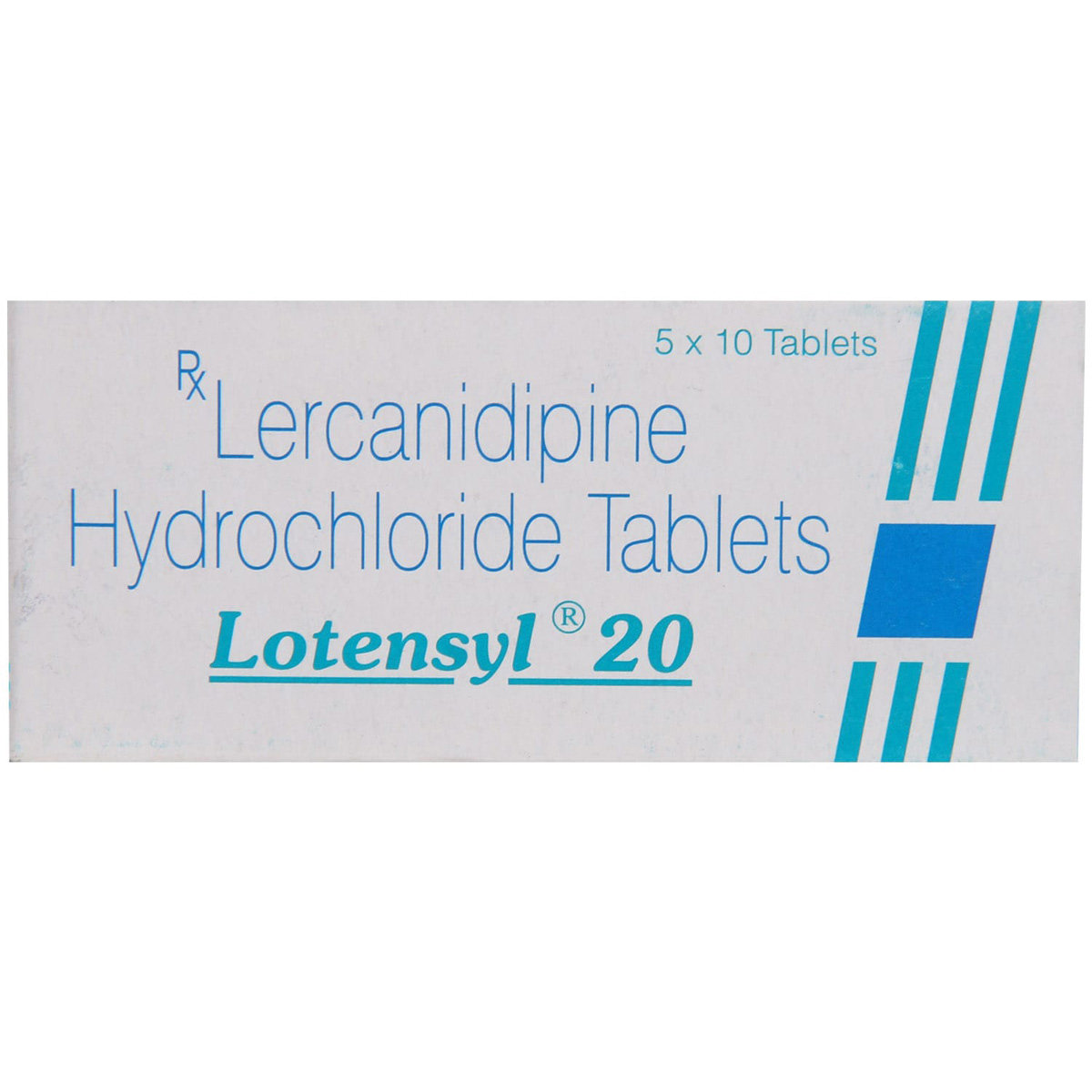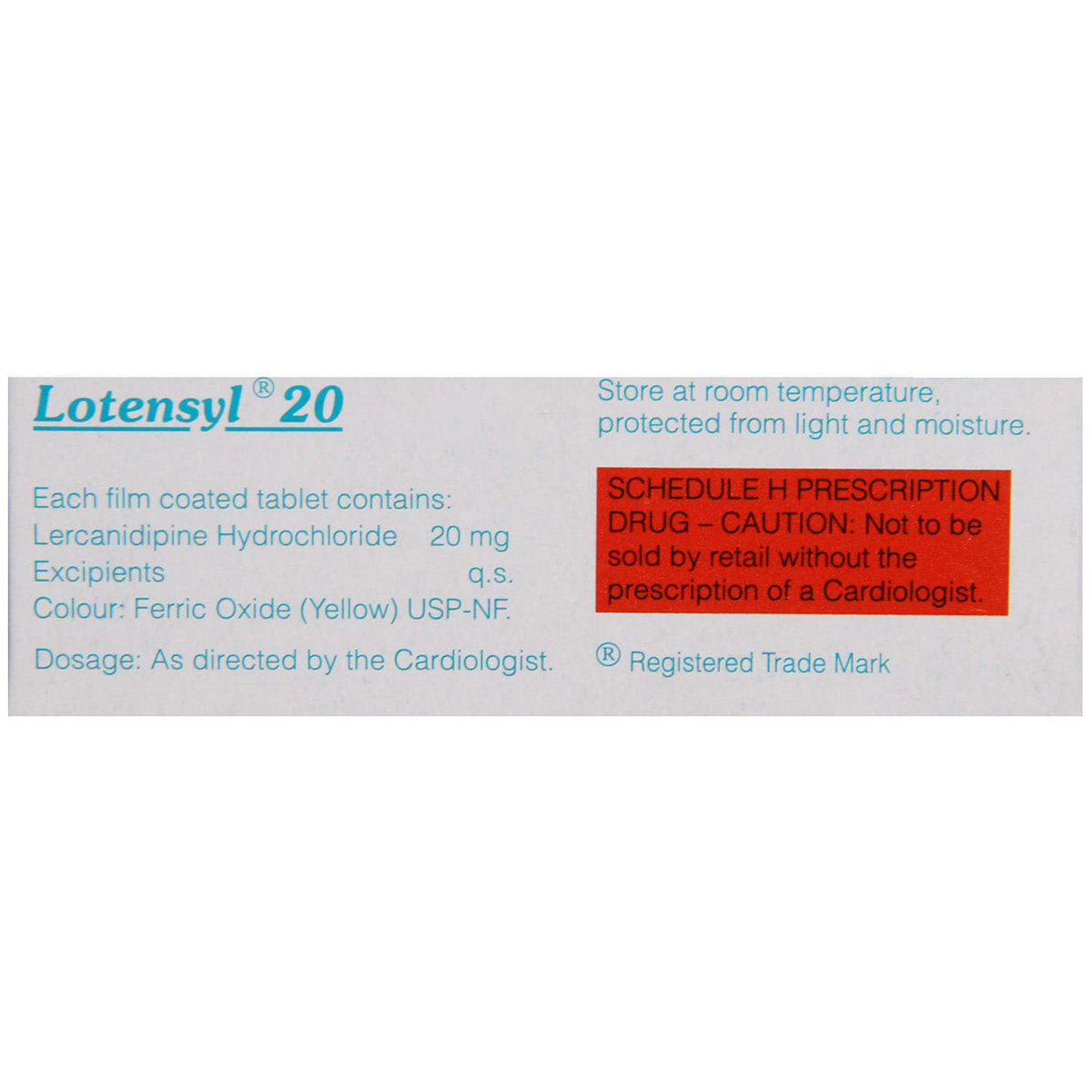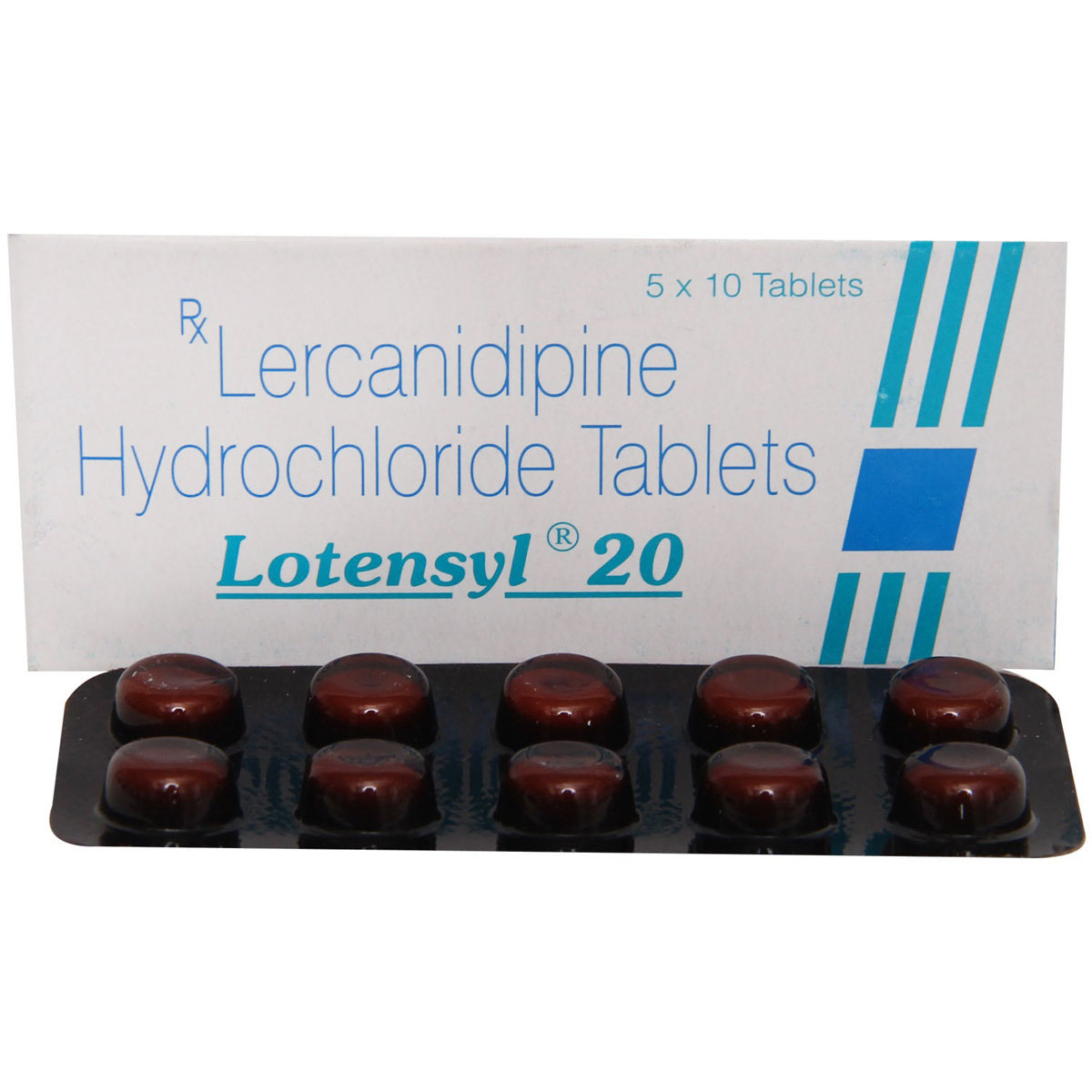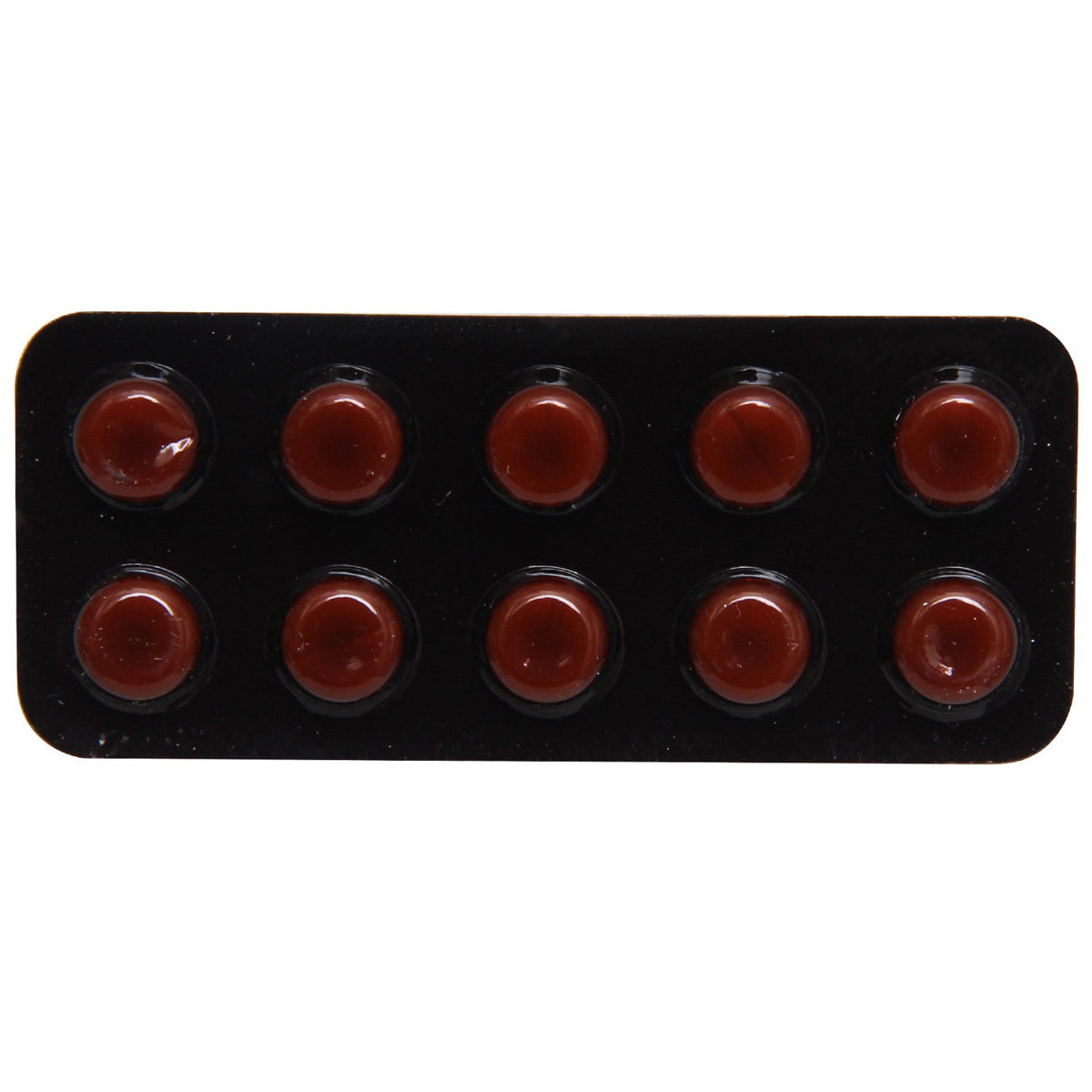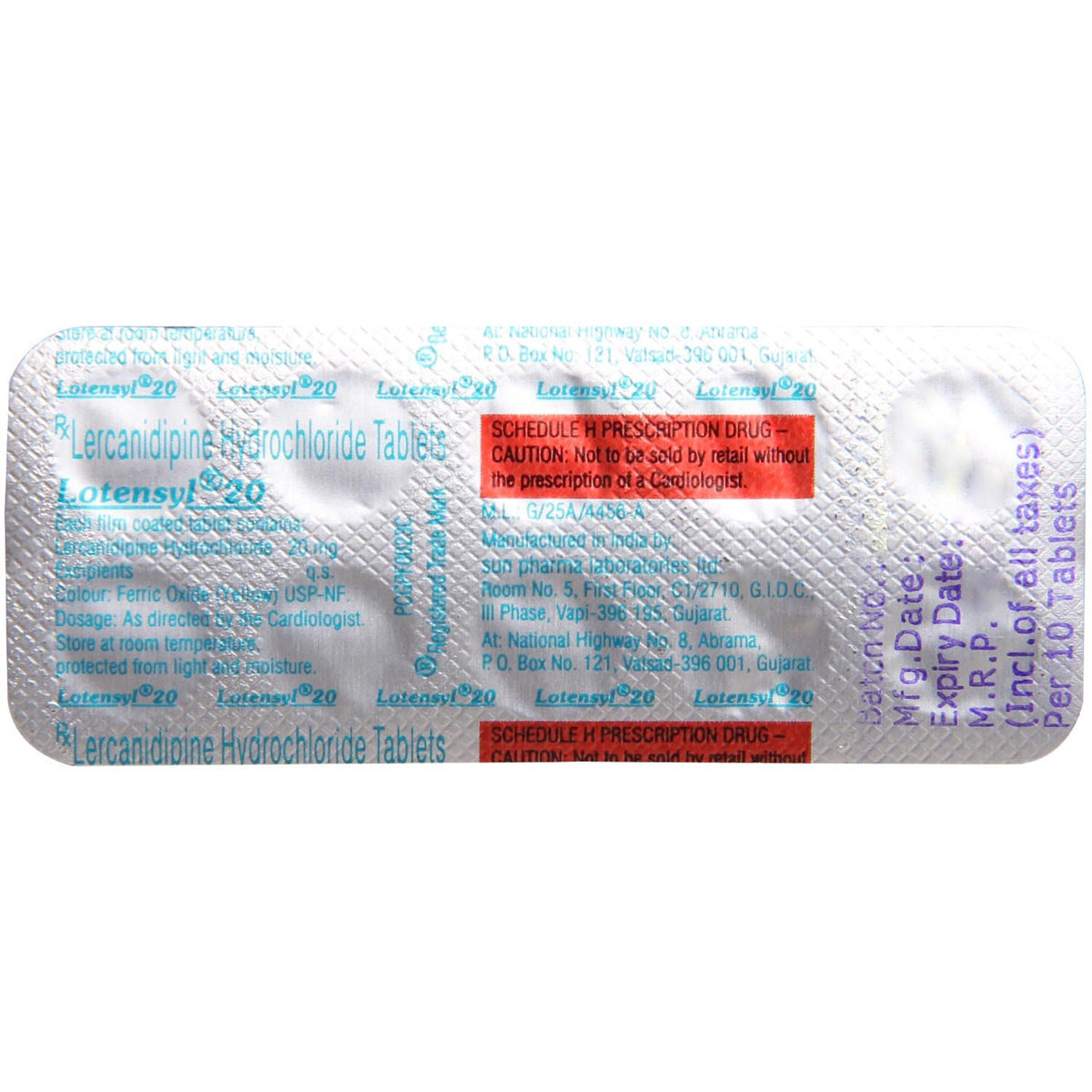Lotensyl 20 Tablet 10's
MRP ₹183
(Inclusive of all Taxes)
₹27.4 Cashback (15%)
Provide Delivery Location
Online payment accepted
 Prescription drug
Prescription drugWhats That
Composition :
Manufacturer/Marketer :
Consume Type :
Expires on or after :
Return Policy :
About Lotensyl 20 Tablet
Lotensyl 20 Tablet belongs to a class of medications called 'antihypertensives' primarily used to treat high blood pressure (hypertension). Hypertension (high blood pressure) is a chronic condition in which the blood force against the artery wall is high. As a result, it leads to heart disease, irregular heartbeat, and other complications.
Lotensyl 20 Tablet contains 'Lercanidipine' that works by relaxing the blood vessels. This reduces the workload on the heart and makes the heart more efficient at pumping blood throughout the body. This medicine needs to be taken regularly to be effective and also for the best results.
Take Lotensyl 20 Tablet as prescribed by your doctor. You are advised to take Lotensyl 20 Tablet for as long as your doctor has prescribed it for you depending on your medical condition. You may experience dizziness, headache, faster heart rate, a feeling of fast or uneven heartbeat (palpitations), sudden reddening of your face, neck, or upper chest (flushing), and ankle swelling in some cases. Most of these side effects of Lotensyl 20 Tablet do not require medical attention and gradually resolve over time. However, if the side effects are persistent, reach out to your doctor.
If you are known to be allergic to Lotensyl 20 Tablet or any other medicines, please inform your doctor. Before taking Lotensyl 20 Tablet , let your doctor know if you have had hypotension (low blood pressure), angina chest pain, or heart problems, liver or kidney disease, or diabetes. Pregnant or breastfeeding women should also consult their doctor before taking Lotensyl 20 Tablet . Lotensyl 20 Tablet is not recommended in children below 18 as safety and efficacy have not been established in children. You should monitor your blood pressure regularly to be sure that the Lotensyl 20 Tablet is working efficiently. And also, a healthy diet, and regular exercise is necessary to keep blood pressure under control. Do not eat grapefruit or drink grapefruit juice while you're taking Lotensyl 20 Tablet . It can make side effects worse. Even a small reduction in sodium in your diet helps improve your heart's health and reduce blood pressure.
Uses of Lotensyl 20 Tablet
Directions for Use
Key Benefits
Lotensyl 20 Tablet is an anti-hypertensive drug that treats high blood pressure (hypertension). Lotensyl 20 Tablet contain ‘Lercanidipine’ that works by relaxing the blood vessels; this lowers your blood pressure and reduces your risk of having a stroke, a heart attack, heart-related chest pain (angina) other heart problems, or kidney problems in the future. This medicine needs to be taken regularly to be effective and also for the best results.
Storage
Drug Warnings
Lotensyl 20 Tablet should not be given to people allergic to Lotensyl 20 Tablet or many of its ingredients. Do not take Lotensyl 20 Tablet if you are allergic to any of its contents or if you recently had a heart attack, angina chest pain, or heart problems. Lotensyl 20 Tablet should be taken with caution in patients with liver or kidney disease, hypotension (low blood pressure), and diabetes. You should monitor your blood pressure regularly to make sure the Lotensyl 20 Tablet is working efficiently. Do not take Lotensyl 20 Tablet if you are pregnant, planning to get pregnant, or breastfeeding women unless prescribed by a doctor. Safety and efficacy of Lotensyl 20 Tablet in children under 18 years have not been established, so it should not be given to them. Lotensyl 20 Tablet causes drowsiness and dizziness, do not drive unless you are alert. Drinking alcohol while using Lotensyl 20 Tablet can cause you to have low blood pressure, and increase dizziness, so avoid alcoholic beverages. Do not eat grapefruit or drink grapefruit juice while you are taking Lotensyl 20 Tablet . It can make side effects worse.
Drug-Drug Interactions
Drug-Drug Interactions
Login/Sign Up
Coadministration of ketoconazole and Lotensyl 20 Tablet may increase the blood levels and effects of Lotensyl 20 Tablet.
How to manage the interaction:
Although taking Ketoconazole and Lotensyl 20 Tablet together can result in an interaction, it can be taken if a doctor has prescribed it. Without consulting a doctor, never stop taking any drugs.
Using Lotensyl 20 Tablet can make cyclosporine more effective at suppressing the immune system.
How to manage the interaction:
Co-administration of ciclosporin with Lotensyl 20 Tablet can possibly result in an interaction, but it can be taken if your doctor has advised it. Avoid taking cyclosporine along with other medications that suppress your immune system. It is important to watch out for any signs of infection and contact your doctor immediately if you experience symptoms such as serious infection, anemia, bleeding problems, paleness, fatigue, dizziness, bruising, fever, chills, diarrhea, sore throat, muscle aches, weight loss, or pain during urination. Do not stop using any medications without first talking to your doctor.
Drug-Food Interactions
Drug-Food Interactions
Login/Sign Up
Diet & Lifestyle Advise
- Keep your weight under control with BMI 19.5-24.9.
- Do regular physical activity or exercise for at least 150 minutes per week, or about 30 minutes most days of the week. Doing this can help you to lower your raised blood pressure by about 5 mm of Hg.
- Opt for a diet rich in whole grains, fruits, veggies, and low-fat dairy products.
- Limit intake of sodium chloride (table salt) in your daily diet to 2300 mg per day or less than 1500 mg is ideal for most adults.
- If you are taking alcohol then only one serving for women and two servings for men is advisable.
- Quitting smoking is the best strategy to lower the risk of heart disease.
- Avoid chronic stress as it can raise your blood pressure. Try to enjoy and spent time with your loved ones to cope with stress and practice mindfulness techniques.
- Monitor your blood pressure daily and if there is too much fluctuation then immediately contact your doctor.
- Try to include heart-healthy omega 3 fatty acid-containing food drinks in your daily diet. You can also use low-fat cooking oil like olive oil, soybean oil, canola oil, and coconut oil can help in lowering your elevated blood pressure.
Side Effects of Lotensyl 20 Tablet
- Dizziness
- Headache
- Faster heart rate
- A feeling of fast or uneven heartbeat (palpitations)
- Sudden reddening of your face, neck, or upper chest (flushing)
- Ankle swelling
Habit Forming
Therapeutic Class
All Substitutes & Brand Comparisons
RX
Out of StockLervasc 20mg Tablet
Lupin Ltd
₹61.47
(₹5.53 per unit)
66% CHEAPER
Author Details
We provide you with authentic, trustworthy and relevant information
Drug-Diseases Interactions
Drug-Diseases Interactions
Login/Sign Up
FAQs
Lotensyl 20 Tablet contain 'Lercanidipine' is a calcium channel blocker (CCB) used to lower high blood pressure (hypertension). They work by relaxing the blood vessels and making the heart more efficient at pumping blood throughout the body.
Lotensyl 20 Tablet is not recommended in pregnancy. Consult your doctor before taking Lotensyl 20 Tablet if you plan to become pregnant or already pregnant. Your doctor will weigh the potential risks and benefits before prescribing Lotensyl 20 Tablet .
Lotensyl 20 Tablet can be safely taken as long as your doctor has prescribed it to you. Conditions such as high blood pressure are lifelong conditions and one should not abruptly discontinue it without discussing it with a doctor.
Lotensyl 20 Tablet is a prescribed drug, given by a physician for preventing specific medical conditions. Taking it on your own can cause unwanted side effects.
You are advised to inform your doctor and monitor your blood pressure for at least two weeks before stopping the medicine. Depending upon your current blood pressure readings, there is a possibility your doctor may lower your medicine dosage and not recommended discontinuing it.
In case, you have missed a dose of Lotensyl 20 Tablet , you are advised to take it as soon as you remember. However, try not to miss a dose in the first place, if its time for you to take your next dose, then do not take both doses together. Take only one dose, taking a double dose of Lotensyl 20 Tablet will lead to low blood pressure (hypotension).
Lotensyl 20 Tablet is known to cause ankle swelling upon long term use. Please try to keep your feet up when sitting for long hours. If the problem persists still, consult your doctor and do as advised.
Drug-Drug Interactions Checker List
- CAPTOPRIL
- ENALAPRIL
- BENAZEPRIL
- FOSINOPRIL
- AMIODARONE
- QUINIDINE
- DIGOXIN
- RIFAMPICIN
- ERYTHROMYCIN
- CLARITHROMYCIN
- KETOCONAZOLE
- ITRACONAZOLE
- RITONAVIR
- CARBAMAZEPINE
- PHENYTOIN
- PHENOBARBITONE
- PRIMIDONE
- AMINOPHYLLINE
- THEOPHYLLINE
Special Advise
- Keep a check on your daily blood pressure, and if you notice any fluctuations, please consult a doctor.
- A low salt/sodium diet and regular exercise and recommended along with Lotensyl 20 Tablet for effective results.
Disease/Condition Glossary
Blood pressure: It is the measurement of the force that our heart uses to pump blood to all parts of the body. Hypertension is a chronic condition when blood pressure is too high. This condition can lead to hardened arteries (blood vessels), decreasing the blood and oxygen flow to the heart. Raised blood pressure can cause chest pain (angina) and heart attack (when blood supply to the heart is blocked). Additionally, high blood pressure also causes brain damage (stroke) and kidney failure. High blood pressure can be diagnosed with the help of a blood pressure monitor or sphygmomanometer. Systolic pressure is the pressure when the heart pumps blood out. On the other hand, diastolic pressure is when your heart is at the resting stage between heartbeats. If your blood pressure is 140/90 mm of Hg, it means the systolic pressure is 140 mm of Hg and, diastolic pressure is 90 mm of Hg. Ideal blood pressure should be between 90/60 mm of Hg and 120/80 mm of Hg.

Have a query?
Alcohol
Safe if prescribed
It is unsafe to consume alcohol, since alcohol consumption with Lotensyl 20 Tablet may increase the risk of low blood pressure and cause adverse effects such as dizziness, fainting, light-headedness or headache.
Pregnancy
Consult your doctor
If you are pregnant, think you may be pregnant, or plan to have a baby, ask your doctor for advice before taking Lotensyl 20 Tablet . Your doctor will weigh the potential risks and benefits before prescribing Lotensyl 20 Tablet .
Breast Feeding
Consult your doctor
Do not take Lotensyl 20 Tablet as it may pass through the breast milk. Please consult your doctor before taking Lotensyl 20 Tablet if you are breastfeeding.
Driving
Safe if prescribed
It is advised to drive with caution after taking Lotensyl 20 Tablet as it usually causes dizziness, weakness, or drowsiness and affects the driving ability.
Liver
Consult your doctor
Let your doctor know if you have any history of liver diseases before taking Lotensyl 20 Tablet . Dosage adjustments are required in patients with liver problems.
Kidney
Consult your doctor
Let your doctor know if you have any history of kidney diseases before taking Lotensyl 20 Tablet . Dosage adjustments are required in patients with kidney problems.
Children
Safe if prescribed
Lotensyl 20 Tablet is not recommended for children below the age of 18 years.

